I checked with my boss and it's okay to tell you: I'm working for @peow_studio! And very happy about it :-) https://t.co/4YxGYbFPvY
— Zainab Akhtar (@comicsandcola) November 21, 2017
Last week, it was announced that the four-year-old comics publisher Peow had hired the prominent comics critic Zainab Akhtar to join the company in an editorial position. The Journal reached out to Patrick Crotty, Olle Forsslöf, and Zainab Akhtar to find out more about what how this came about and what it means for the future of Peow.
The Comics Journal: What's the official announcement from Peow on bringing Zainab aboard?
Patrick Crotty: Well, It's the first time we are actually bringing in a new person to Peow, so we didn't really think we would have to make an official announcement. But I do guess it is a business type thing to do. But *spoilers* nobody at Peow is actually a businessman--the suits are just for show. We asked Zainab if she would like to edit books for us and she said yes. So, "officially," Zainab is an Editor/Book/Manager at Peow. We don’t have special titles because we do like 5+ jobs combined!
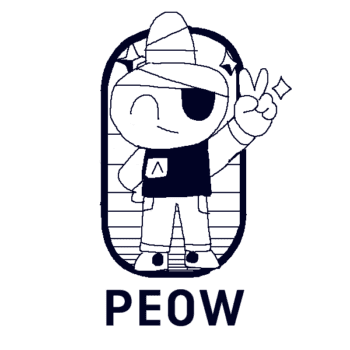 Were you looking to bring a new person aboard to fill a specific role, or were you looking to bring Zainab aboard specifically, and created a role for that purpose?
Were you looking to bring a new person aboard to fill a specific role, or were you looking to bring Zainab aboard specifically, and created a role for that purpose?
Patrick Crotty: Well... we had had some changes to Peow the last year or so, but most recently, its been that we actually can pay ourselves for editing work. Our set up is a bit strange, and we don’t have a monthly salary at Peow, but it’s more on a project to project basis, so each book we edit, whoever is editing that book gets paid x amount. It's flexible, [because] if something comes up outside of Peow, then you can work on that instead.
Olle Forsslöf: We’re all doing everything. We don't really have roles, which might be a really inefficient way to work, come to think of it.
What were the changes that happened in the last year?
Patrick Crotty: The biggest change is that we started to pay ourselves for the book production and editing, which we didn't do before. We stopped riso printing, Elliot from Peow decided to take a break to do other things and, um... Olle had a baby!
That’ll do it!
Patrick Crotty: Right now, we're pretty streamlined, only making books, so it makes it easier to actually think like about "what would be good to make books." We are also are getting Blackbox to do distribution next year, there'll be more time to do other things now that someone else is sending out our mail.
Over to you Zainab—what has your relationship with Peow been like? Am I incorrect in thinking that you were one of the first critics to write extensively about them?
Zainab Akhtar: No, you're not. I think I first came across some of their books on Tumblr, and bought a few titles which I really liked. What impressed me a lot was the production values, and the clear care and thought put into making the book a full thing. Risograph comics weren't as booming then as they are now, and at that time Peow was working soley with the riso, and so the books looked really fresh and great. I reached out to interview the guys, and we've kept in touch since then, and obviously met at various conventions and hung out. But the relationship simply started from me liking their comics and liking what they do.
Olle Forsslöf: Once Zainab had reached out and we read what she written about us, and about other comics on Comics&Cola, we felt that she was very serious and into the nitty gritty stuff about comics. It’s cool to see someone write in depth about something you'd made. I think the best thing about working with Zainab is that we know she has great taste in comics, and she's got an eye for interesting stuff. It's good to have someone new with another set of eyes than me or Pats.
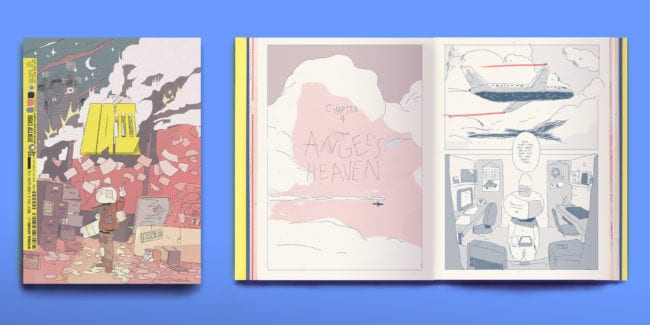 Patrick Crotty: The match [with Zainab] is good because, since we started and meeting and talking and seeing ShortBox, i don’t think there is any other person publishing comics that we have such similar taste with. I think anything Zainab wants to publish is something we’d love to make anyways, so we will never be fighting each other. Working with us is good because now we have the budget to make bigger books and production expertise that ShortBox doesn’t have, so... Zainab can make bigger books! Working with other people is good. I really don’t like having to work alone, and just having another person with different influence can be great. Me and Olle, we’re like so much the same now that we can’t surprise each other anymore. He always knows when I am making a joke.
Patrick Crotty: The match [with Zainab] is good because, since we started and meeting and talking and seeing ShortBox, i don’t think there is any other person publishing comics that we have such similar taste with. I think anything Zainab wants to publish is something we’d love to make anyways, so we will never be fighting each other. Working with us is good because now we have the budget to make bigger books and production expertise that ShortBox doesn’t have, so... Zainab can make bigger books! Working with other people is good. I really don’t like having to work alone, and just having another person with different influence can be great. Me and Olle, we’re like so much the same now that we can’t surprise each other anymore. He always knows when I am making a joke.
Zainab, were you actively looking to take on some kind of editorial role outside of your work with ShortBox?
Zainab Akhtar: No. But that was more from giving up on being approached by someone. I know what I can do and my abilities and limitations, but no-one has ever reached out to me to edit comics or for any kind of role within the making of comics side.
And you were looking for that kind of role.
Zainab Akhtar: I guess I had maybe harbored an idea that someone (within comics) would hire me to work as an editor. I don't want to say hoped, because that's too strong a word; i never really believed it would happen, when you look at the viable companies out there in terms of who'd be in a position to pay, and who would fit in terms the 'eye' I have, I don't think there's anybody with whom I match up, and I'm not very compromising. Working for Peow genuinely feels like one of those 'if you wait it will come' situations, though. Specifically in terms of fit. I feel we're all familiar with what we each to do, our tastes, and that we're on the same page as to what we we're trying to achieve.
What does this mean for the future of ShortBox? Will you continue that project as it currently is set up, or do you intend to bring that into the PEOW umbrella?
Zainab Akhtar: Yes, ShortBox will continue as before. 2017 has been the first full year of my being self-employed with ShortBox. I've published something in the region of twenty books by a range of fantastic people from Richie Pope, Bianca Bagnarelli, Rosemary Valero O'Connel, Jonathan Djob Nkondo and so many amazing artists who I feel incredibly lucky to have worked with. So, I'm planning to continue ahead and take it as far as I can. It works really well, too, because the system of the box essentially allows new books to be produced every quarter, which are then sold individually online and at cons.
Patrick Crotty: The way we have our work set up, like project to project basis, it makes it pretty easy to have someone else working with us. Zainab could make one book, or she could make 100. It’s really all up to how much time she wants to work on books with us, and it still leaves her with time to do Shortbox or whatever other work she wants to do. So, even there it clicks so well.
Zainab Akhtar: FYI: I'm going to make a lot of books.
Great! Could we talk a little about the genesis of PEOW? Had either of you worked in comics or publishing before you started PEOW?
 Olle Forsslöf: No, we were friends. Me and Elliot had gone to art school together and I met Patrick studying french in Paris. The three of us just had a lot in common regarding what we liked and disliked as well. We did a lot of non-comic work together. We made a board game, and it was really bad, but we liked the team work. And eventually we set up a table at the Swedish comic book festival, and soon after that we thought we should get a riso to print better looking comics. We had no idea what it was or how it worked, but we'd seen stuff online that people made on a "riso" so we just went for it. That's basically how it began.
Olle Forsslöf: No, we were friends. Me and Elliot had gone to art school together and I met Patrick studying french in Paris. The three of us just had a lot in common regarding what we liked and disliked as well. We did a lot of non-comic work together. We made a board game, and it was really bad, but we liked the team work. And eventually we set up a table at the Swedish comic book festival, and soon after that we thought we should get a riso to print better looking comics. We had no idea what it was or how it worked, but we'd seen stuff online that people made on a "riso" so we just went for it. That's basically how it began.
I think it's interesting how the first thought that y'all seemed to have was "let's set up our own company" to do the books--you're passing over that like the decision is a common one!
Olle Forsslöf: Since all of us had another job to make a living of, it wasn't a super big serious decision. It was more that we got the opportunity to do it and we did.
Patrick Crotty: Peow was a side hustle for a long time. It's still like a side hustle more or less but it's where all our energy goes.
Olle Forsslöf: Yeah, a real energy thief. Our hopes, or at least mine, is to eventually make a living of off Peow. But we need to build our audience and to be able to make larger print runs for that to happen.
Patrick Crotty: I feel a lot of what we've done, (at least for me) has come out of frustration too haha, it sounds bad but…
Olle Forsslöf: In a good way!
Patrick Crotty: We started making books because we didn’t like what the rest of Sweden was publishing, We got risograph because we were frustrated that there was no good way to print here, we pay our artists more and are very transparent because we were mad when we heard how other publishers were so bad at paying/taking care of their artists, and I feel like, for me at least, I wanted to work with Zainab because I was mad nobody else was! She is really good at what she does, and I want people to be able to see that. I think that there are a lot of chumps working in comics and even big "older publishers" are just moving so slowly and still making mistakes.
Zainab Akhtar: It's true.
Olle Forsslöf: All that Patrick says is 100% true.
Patrick Crotty: Peow is never gonna publish a book by somebody without making sure that artists are actually... good people. I know publishers gotta make money but like… D&Q the last year, I'm so upset that they even considered Berliac, and the Terms and Conditions book it's like why... waste time and money promoting that stuff? Ofc yeah its probably a cash cow for anybody buying books in gift stores but... it's not telling a story and not moving anything forward. Even Bartkira. I think that was the worst.
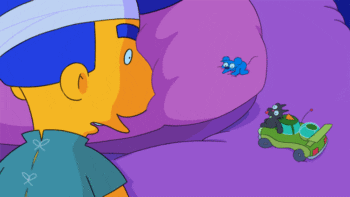 Zainab Akhtar: I hate Bartkira. I don’t get the point of it.
Zainab Akhtar: I hate Bartkira. I don’t get the point of it.
Patrick Crotty: That’s why we like Zainab!
Olle Forsslöf: We think so alike! I used it as an example in my comic class of: what is the purpose?
Zainab Akhtar: People whose work I like and respect have said Bartkira helped them because it encouraged them to work on something and it has a very specific remit as to what is required. I understand that, but I also feel the page is open for people to work on anything at all, you know? Essentially, I think it functions like fanfiction, in that it provides some visibility and there's the remove of fear or being daunted by producing something entirely your own and new. But the way it sprawled into this big thing with exhibitions and book volumes weirds me out.
Terms & Conditions--What does it *do*? It lacks purpose.
Patrick Crotty: I think that publishing books like Terms & Conditions also shows young people that "hey I can make real nonsense and get published." It’s not... inspirational. I think these things are fine as jokes or self published vanity projects. But what I feel is strange is when a publisher goes ahead with spending money and time to publish something that should have just stayed as a Twitter post.
Zainab Akhtar: People talk about this change happening in comics, but that change isn't something that's happening *to* people. It's change that individuals are making for themselves. It's pockets of air.
What is pockets of air? The conversation around change?
Zainab Akhtar: Comic companies, publishers, whatever aren't out here hiring black and brown people, you know? It's not happening. There are lots of independents who are doing it for themselves, which is great to see. But those people are mostly only in a position to sustain themselves, not move further and hire others. The two companies I see attempting it are Iron Circus Comics and Lion Forge. So opportunities are lacking in exactly the same way as before this supposed change happened. It's harder to build infrastructure in this way.
You believe that publishers and editors should be actively seeking to publish and promote works by people of color as opposed to paying lip service to these issues without actually putting out the work.
Zainab Akhtar: Erm, fuck yes. All that has happened is that people now know to put up a front of progressiveness and espouse some meaningless waffle. And lots of people buy it. I'm not sure why.
Patrick Crotty: Like “woke” people on Twitter.
Zainab Akhtar: Yep.
Patrick Crotty: Yeah and it's really easy to see through, too… but I feel like lots of people can’t see through that! Sometimes we get these weak efforts from a publisher (or other types of media really...), you can just publish one book by a POC and check it off your list. It's something you have to keep doing, constantly. Then there are also books that really heavily promote that it is by a POC, and I think it's a touchy subject — on one hand I think it's good and straightforward that these authors are getting promoted, but also I feel like it can come off as wrong, especially depending on who is publishing it. It feels a bit like that white person who points out that they have POC friends because they want to prove.... something?
Zainab Akhtar: Yeah, I always feel iffy saying 'hey I'm a brown Muslim woman doing this or that' but that's personal to me. It's definitely a useful way for people to market themselves, and for others to find work. But it can be constricting, too. Ideally, I'd like to simply be seen as a person with specific talents and characteristics, of which my racial and religious identity is part, but that's not generally a luxury I have.
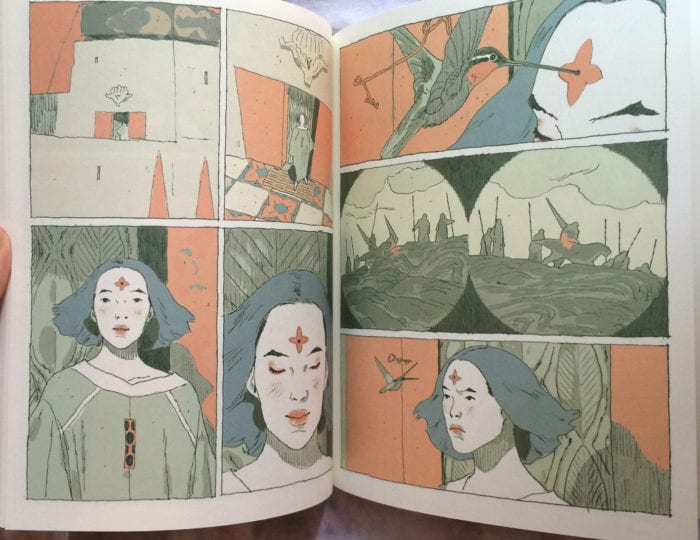 Olle Forsslöf: Our goal when we started out was to publish books we enjoy ourselves one way or another. Mostly if we liked the artwork. We're all artists ourselves, and we reached out to other artists that we looked up to on Tumblr. Then we didn't touch the book once it was sent to us, we just printed it and sold it. Now we're trying to be editors and we try and make the books worth while both art and storywise. Even if it's not 100% of both bits always, there's always something with the book that really clicks with us and that we feel it's worth putting out. I'm mostly not thinking of if others are gonna like the book, even though I hope for it. It's always most important that I like the book, if that makes sense.
Olle Forsslöf: Our goal when we started out was to publish books we enjoy ourselves one way or another. Mostly if we liked the artwork. We're all artists ourselves, and we reached out to other artists that we looked up to on Tumblr. Then we didn't touch the book once it was sent to us, we just printed it and sold it. Now we're trying to be editors and we try and make the books worth while both art and storywise. Even if it's not 100% of both bits always, there's always something with the book that really clicks with us and that we feel it's worth putting out. I'm mostly not thinking of if others are gonna like the book, even though I hope for it. It's always most important that I like the book, if that makes sense.
Zainab Akhtar: I used to work in comics retail. And I was utterly shit at selling. I couldn't do it. Mostly because I sucked at selling things I didn't like. Which was 90% of what was on the shelves. To me, it's just about finding interesting, good work. It doesn't have to be the next best thing, morally complex, giving out some message, as long as it's got something about it that I think is worthwhile. And if it has that, that's enough for me. I never have a problem selling ShortBox books at cons because I believe in each and every one.
How do you find that interesting work? Does Peow take submissions? Tumblr scouring?
Patrick Crotty: We look at submissions but we’ve never published a submission.
Zainab Akhtar: Sometimes I get people emailing me unsolicited submissions and it's across the board shit.
Olle Forsslöf: To this day all the books we've published it's been us approaching the artist.
Patrick Crotty: Mostly through internet or at festivals, not so much tumblr nowadays.
Zainab Akhtar: Everyone says Tumblr is dead but I love it.
Olle Forsslöf: I love it too, I still find gems on tumblr.
Zainab Akhtar: Probably because I don't interact with anyone and I'm not putting anything out on there.
Patrick Crotty: I still look at Tumblr every day but now the good stuff on Tumblr is mostly just old anime and manga drawings.
Zainab Akhtar: Lots of artists have left Tumblr. Which is a shame!
Olle Forsslöf: Where are they posting? I hate scrolling through Twitter feeds and Instagram is so tiny.
Patrick Crotty: I actually really liked the hashtag whatever artist thing that was going on. I found a lot of new people that way.
Zainab Akhtar: Yeah! The South Asian tag was really useful to me.
Patrick Crotty: And then at the end just... white guys used #artistontwitter, and it was so lame because they were butt-hurt they didn’t have a tag.
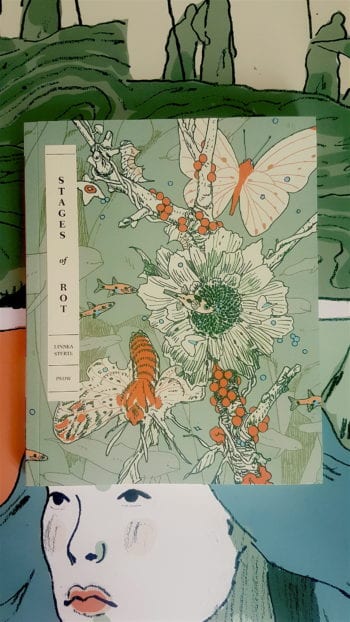 What do you have planned for 2018?
What do you have planned for 2018?
Zainab Akhtar: 4 ShortBoxes...so another 20 or so books. I'm gonna make lots of books so the guys will have to make me rich!
Patrick Crotty: Yes, our main goal for 2018 is that we all get rich.
Olle Forsslöf: Great! We have a bunch of books in the making… but we're so loose that we don't have a set date for any of them almost. We try and get a few new books to the big festivals.
Zainab Akhtar: I'm the opposite of the guys. I am very organized and have dates set for everything
Mainly because ShortBox is on a tight schedule/turnaround, and if it fails I can't eat!
Olle Forsslöf: That’s a good motivation.
Zainab Akhtar: I love food, Ollie!
Olle Forsslöf: Who doesn’t?
Zainab Akhtar: Vegans…
Patrick Crotty: To answer your question: For the spring, we're working with Chu Nap, Diigii Daguna & Mathilde Kitteh, Freddy Carrasco might have a new book, Valentin Seiche, Alex Gouin Fafard, GAX & something new from Jane Mai.
Zainab Akhtar: I feel like announcing books before they’re in my hands is asking for it.
It sounds like the next year has a lot of titles. Will they all be available in the US through Black Box? Has the process of using them for fulfillment begun yet?
Patrick Crotty: It's going to be the first time using them in February. I don’t know any other book publishers using them, but they are a very young company doing lots of interesting things within order fulfillment. But I'm very excited for that. All the books will be available through them, or via our website.
When is the FIRST time that people will see the Zainab era of Peow in physical form?
Zainab Akhtar: I’m aiming for TCAF…. But spring summer, hopefully. All being well!
Patrick Crotty: We are going to change our name to Peoz first.
Zainab Akhtar: It's only fair. Pee Oh Zee. It works!






